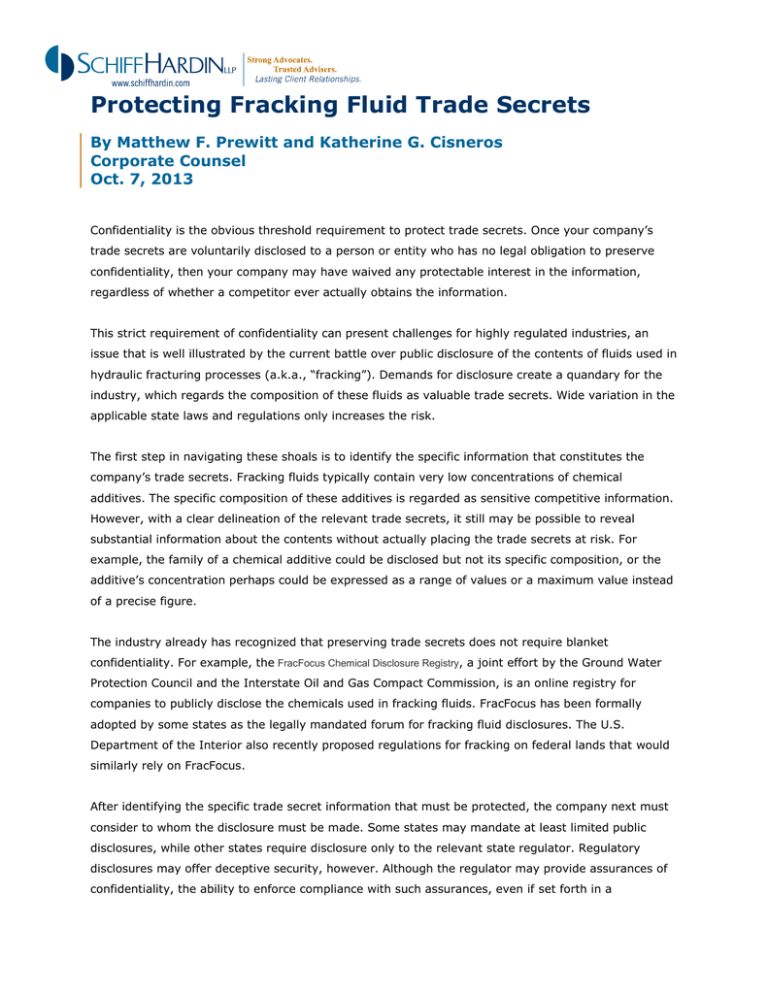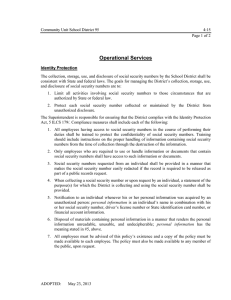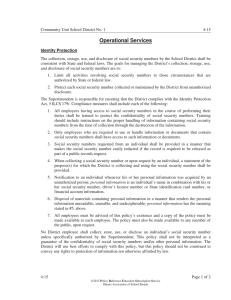
Protecting Fracking Fluid Trade Secrets
By Matthew F. Prewitt and Katherine G. Cisneros
Corporate Counsel
Oct. 7, 2013
Confidentiality is the obvious threshold requirement to protect trade secrets. Once your company’s
trade secrets are voluntarily disclosed to a person or entity who has no legal obligation to preserve
confidentiality, then your company may have waived any protectable interest in the information,
regardless of whether a competitor ever actually obtains the information.
This strict requirement of confidentiality can present challenges for highly regulated industries, an
issue that is well illustrated by the current battle over public disclosure of the contents of fluids used in
hydraulic fracturing processes (a.k.a., “fracking”). Demands for disclosure create a quandary for the
industry, which regards the composition of these fluids as valuable trade secrets. Wide variation in the
applicable state laws and regulations only increases the risk.
The first step in navigating these shoals is to identify the specific information that constitutes the
company’s trade secrets. Fracking fluids typically contain very low concentrations of chemical
additives. The specific composition of these additives is regarded as sensitive competitive information.
However, with a clear delineation of the relevant trade secrets, it still may be possible to reveal
substantial information about the contents without actually placing the trade secrets at risk. For
example, the family of a chemical additive could be disclosed but not its specific composition, or the
additive’s concentration perhaps could be expressed as a range of values or a maximum value instead
of a precise figure.
The industry already has recognized that preserving trade secrets does not require blanket
confidentiality. For example, the FracFocus Chemical Disclosure Registry, a joint effort by the Ground Water
Protection Council and the Interstate Oil and Gas Compact Commission, is an online registry for
companies to publicly disclose the chemicals used in fracking fluids. FracFocus has been formally
adopted by some states as the legally mandated forum for fracking fluid disclosures. The U.S.
Department of the Interior also recently proposed regulations for fracking on federal lands that would
similarly rely on FracFocus.
After identifying the specific trade secret information that must be protected, the company next must
consider to whom the disclosure must be made. Some states may mandate at least limited public
disclosures, while other states require disclosure only to the relevant state regulator. Regulatory
disclosures may offer deceptive security, however. Although the regulator may provide assurances of
confidentiality, the ability to enforce compliance with such assurances, even if set forth in a
confidentiality agreement or the agency’s own regulations, may be limited by the state’s opengovernment or open-records statute. Most state statutes include some protection for trade secrets
disclosed in regulatory applications, but only with proper compliance with the procedures mandated by
the statute.
A third consideration is timing, which under narrow circumstances may give rise to a federal
constitutional claim under the Takings Clause. Although there is little doubt that a government agency
may condition a permit or license to conduct commercial activities on a prospective waiver of
confidentiality, at least where such disclosures are reasonably related to the regulated activity, a
retroactively-imposed disclosure requirement that would destroy the value of a company’s trade
secrets may not pass constitutional muster. At least some Takings Clause precedents support an
argument that the owner of a trade secret should be given the opportunity to forego use of the trade
secret in a regulated activity in order to avoid public disclosure of the information. A retroactive
disclosure requirement deprives the trade secret owner of that choice.
There is no one-size-fits-all solution in the current regulatory landscape, because applicable law varies
widely from state to state. At least 15 of the 29 states with confirmed hydraulic fracturing activity
have laws requiring disclosure of information about the chemicals and additives in hydraulic fracturing
fluid. Legislation requiring disclosure is pending in at least an additional seven states.
Some states, such as West Virginia, require parties to disclose anticipated chemicals and additives
prior to fracturing; the parties are then required to provide information on the chemicals and additives
actually used when fracturing is completed. Other states, such as New Mexico, require disclosure only
after fracturing is completed.
The level of disclosure required in each state depends on how specifically a party must describe the
fracturing fluid. Only seven states require that the Chemical Abstract Service number (CAS) be
disclosed for all additives used. Other states, such as Ohio, require disclosure of the “maximum
concentration” of additives, in addition to the CAS number. States that do not require a CAS number
limit the disclosure of chemicals to those defined as hazardous substances by the Occupational Safety
and Health Administration and require only the information that would be included on a Material
Safety Data Sheet. Recent proposed regulations tend to require greater specificity. For example, the
Alaska Oil and Gas Conservation Commission has proposed new regulations that would require
disclosure by additive type (e.g., acid, demulsifier, etc.) and chemical ingredient name, CAS number,
and rate or concentration.
Alaska’s proposed regulations also stand out because they provide no trade secret exemption. If the
regulations are enacted as proposed, not only will Alaska require very specific disclosure of the
chemical compounds and additives in fracturing fluids, but Alaska will be the only state to not provide
any protection from public disclosure for confidential business information concerning fracking fluid
contents. If adopted, these regulations seem likely to invite litigation.
In short, a company seeking to preserve the confidentiality of its fracking fluid trade secrets faces an
uncertain legal environment requiring a state-specific strategy for each jurisdiction where the
company does business, coupled with continuous monitoring of a rapidly evolving regulatory
landscape. Industry participants must proceed with care.
Matthew F. Prewitt is partner at Schiff Hardin and co-chair of the firm’s trade secrets client services team. He
represents clients as trial counsel in complex civil litigation in a broad range of disputes across the United States.
Katherine G. Cisneros is an associate at the firm.
Reprinted with permission from the October 7, 2013, issue of Corporate Counsel.
© 2013 ALM Media Properties, LLC.
Further duplication without permission is prohibited. All rights reserved.


